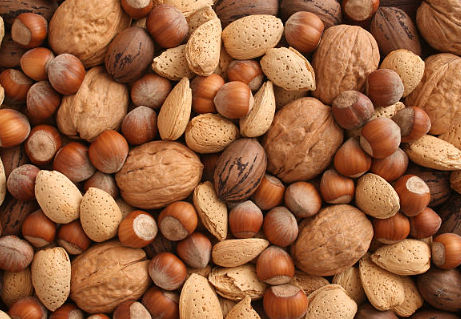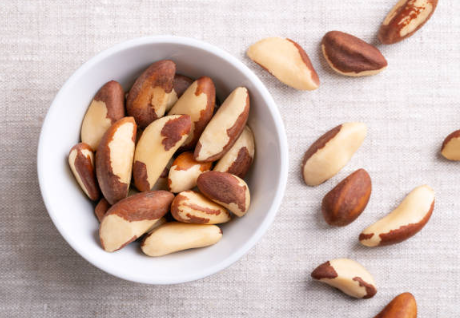If you’re looking for a simple way to increase your daily protein intake, nuts are a smart and satisfying choice. Not only are they rich in protein, but they also pack a nutritional punch with fiber, healthy fats, vitamins, minerals, and protective plant compounds.
While all nuts offer benefits, some stand out for their higher protein content—making them especially useful for those looking to build muscle, support metabolism, or simply feel fuller longer.

Why Nuts Are a Great Source of Plant-Based Protein
Nuts are near-perfect plant-based foods. They deliver a powerful combo of:
-
Healthy fats
-
Plant protein
-
Fiber
-
Micronutrients (like magnesium, copper, zinc)
-
Phytonutrients (plant compounds with antioxidant and anti-inflammatory effects)
Unlike meat or eggs, which require refrigeration and cooking, nuts are shelf-stable and portable—perfect for tossing in your bag, keeping in your desk drawer, or stashing in your car for a protein boost anytime.
They pair just as well with sweet ingredients (like oats or chocolate) as they do with savory ones (like grain bowls, salads, or veggie dishes), and they add flavor and crunch to everything from smoothies to baked goods.
➡️ Serving tip: A typical serving of nuts is 1 ounce—about ¼ cup or a small handful.
1. Peanuts
7.43 g protein per ounce (roasted)
Technically a legume, peanuts are still nutritionally similar to tree nuts—and widely accepted as part of the nut family.
Rich in plant-based protein, fiber, healthy fats, vitamin E, and copper (a mineral key for energy production and immune support), peanuts are incredibly versatile.
How to use:
-
Sprinkle chopped peanuts on oatmeal or salads
-
Add peanut butter to chia pudding, noodles, or soups for extra protein
2. Almonds
6.01 g protein per ounce (whole)
Almonds are one of the best nuts for boosting your protein intake. They’re also rich in magnesium, a mineral most people don’t get enough of—yet it’s vital for blood sugar control, blood pressure, and stress response.
Just ¼ cup of almonds provides around 18% of your daily magnesium needs.
Ways to enjoy:
-
Add sliced or slivered almonds to salads
-
Use almond flour in baked goods or as a coating for chicken or fish
-
Pair roasted almonds with dried or fresh fruit for a protein-rich snack

3. Pistachios
5.95 g protein per ounce (roasted)
Pistachios aren’t just high in protein—they’re also rich in potassium, a mineral most Americans are deficient in. In fact, studies show pistachios have the strongest effect among nuts in lowering both systolic and diastolic blood pressure.
Quick idea:
Mix a handful of pistachios with dried cherries for a sweet, salty, fiber- and protein-packed snack.
4. Cashews
4.34 g protein per ounce (roasted)
Creamy and slightly sweet, cashews are a go-to in both sweet and savory recipes. Blend them into smoothies or combine with dates and coffee for an ultra-smooth, dairy-free coffee creamer.
Cashews are linked to improved heart health thanks to their fiber, healthy fats, and antioxidants. Research shows they may help lower triglycerides, LDL cholesterol, blood pressure, and insulin levels.
5. Hazelnuts
4.25 g protein per ounce (roasted)
Known for their rich, nutty flavor, hazelnuts shine in desserts and chocolate treats—but they also taste great in savory dishes.
They’re packed with vitamin E, vitamin K, manganese, and phenolic antioxidants like gallic acid, quercetin, and caffeic acid, which help reduce inflammation and protect cells from damage.
Try them:
-
Ground into hazelnut flour for baking
-
Tossed into granola or trail mix
-
Crushed over salads or grain bowls

6. Brazil Nuts
4.05 g protein per ounce (raw)
Brazil nuts are known as one of the richest dietary sources of selenium, a mineral crucial for thyroid health, reproduction, and antioxidant defenses.
Just one Brazil nut can meet your entire daily selenium requirement.
They’re also a good source of fiber, protein, and heart-healthy minerals like magnesium and zinc.
7. Walnuts
4 g protein per ounce (roasted)
Walnuts are mild, slightly sweet, and incredibly versatile. They’re often added to oatmeal, yogurt parfaits, salads, or baked into cookies and banana bread.
They’re also praised for improving blood lipid levels, vascular function, and reducing blood pressure, making them a heart-smart choice.
8. Pine Nuts
3.88 g protein per ounce (dry)
Although technically seeds from pine trees, pine nuts are classified as nuts by the FDA. They’re soft, slightly buttery, and loaded with vitamin E, magnesium, copper, manganese, and zinc.
Pine nuts are also a source of plant sterols and carotenoids, antioxidants that protect cells and may help lower disease risk.
Toss them into:
-
Pesto
-
Roasted veggie bowls
-
Creamy soups for a subtle crunch
Final Thoughts
Looking for an easy, delicious way to increase your protein intake? Head to the nut aisle. Nuts are not only rich in protein, but also packed with essential nutrients, healthy fats, and powerful plant compounds.
Incorporating a variety of nuts into your diet can help support heart health, blood sugar balance, and weight management—without sacrificing taste.